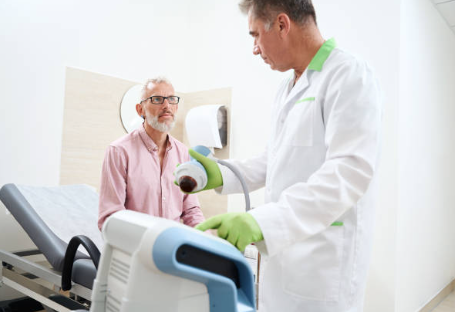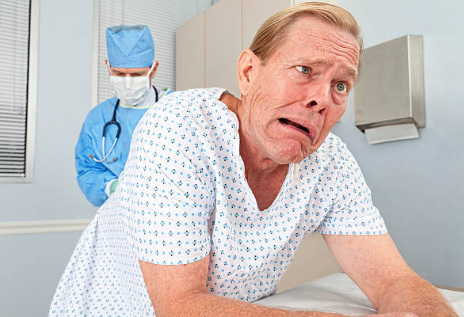Finasteride Side Effects – Read this before you take it.

Urgent: Finasteride Side Effects. What You Need to Know Before Taking Finasteride
Finasteride—it sounds like a promising solution for hair loss or an enlarged prostate, doesn’t it? You might jump at the chance to save your hairline. But hold on a minute! Before you do, let’s have a real talk about the side effects that could rock your world.
How Finasteride Can Disrupt Your Mental Well-Being
Finasteride works by messing with your hormones, and that can throw your brain chemistry out of whack. Here’s what some men report experiencing:
- Depression’s Dark Cloud: Feelings of sadness, hopelessness, and loss of interest in activities you once enjoyed.
- Anxiety’s Tight Grip: Excessive worry, nervousness, and even panic attacks.
- Brain Fog Blues: Difficulty concentrating, remembering things, and making decisions.
- Suicidal Thoughts: In the most severe cases, some men experience disturbing thoughts of self-harm.
Don’t Ignore These Warning Signs when using Finasteride !
If you notice changes in your mood or mental health after starting finasteride, it’s absolutely crucial to speak to your doctor right away. Don’t brush it off – your mental well-being is just as important as your physical health.
Finasteride’s Shocking Impact on Your Sexuality: The Truth You Need to Hear
Finasteride can take a serious toll on your sex life. Imagine this: your libido takes a nosedive, you struggle to get or maintain an erection, and even your ejaculations seem weaker. Not exactly the scenario you dream about, right? Unfortunately, these are very real side effects that finasteride can trigger in some men.
Don’t Ignore the Warning Signs: Finasteride and Sexual Side Effects
It’s crucial to pay attention to these potential red flags that could signal trouble in the bedroom:
- Low Sex Drive: Feeling less interested in sex than usual? Finasteride could be the culprit.
- Erectile Dysfunction (ED): Difficulty getting or keeping an erection is a frustrating and surprisingly common side effect.
- Less Powerful Orgasms: Your orgasms may feel weaker or less satisfying.
- Changes in Ejaculate: You might notice a decrease in the amount of semen you produce.
Finasteride: Are the Side Effects Forever? The Troubling Truth
One of the most burning questions about finasteride is whether the side effects can linger long after you stop taking the medication. While the majority of men experience side effects that disappear when they discontinue finasteride, there’s a troubling reality: for a small percentage of men, the answer is a haunting “yes.”

Post-Finasteride Syndrome (PFS): The Nightmare That Could Last
The promise of thicker hair or relief from an enlarged prostate may fade fast if you face the potential nightmare of Post-Finasteride Syndrome (PFS). This poorly understood condition can leave some men grappling with a devastating and life-altering array of persistent side effects, including:
Sexual Devastation:
- Erectile Dysfunction (ED): Difficulties achieving or maintaining an erection, stealing your confidence and intimacy.
- Loss of Desire: Your once-healthy sex drive may vanish, impacting your relationships and self-image.
- Ejaculation Changes: Reduced volume or even the disappearance of ejaculate can be a confusing and distressing blow.
Mental Anguish:
- Depression’s Dark Cloud: A persistent feeling of sadness or hopelessness can overshadow your life.
- Anxiety’s Grip: Worry and nervousness can become overwhelming and debilitating.
- Brain Fog Blues: Difficulty concentrating or remembering things can make everyday tasks a frustrating struggle.
- Suicidal Thoughts: In the most severe cases, despair may lead to dangerous and disturbing thoughts.
Your Body Betrayed
- Muscle Loss: Weakness and loss of muscle mass can undermine your strength and physique.
- Gynecomastia: The development of breast tissue in men can be disfiguring and emotionally damaging.
- Penile Shrinkage: A change in the size of your penis can be a devastating blow to your self-concept.
The Science Behind PFS: Why Does it Happen?
The persistence of finasteride side effects, even after stopping the medication, is a troubling reality known as Post-Finasteride Syndrome (PFS). While understanding of PFS is evolving, researchers are exploring several potential culprits:
Changes to the Brain: Finasteride’s Impact on Neurochemistry
Finasteride blocks DHT, a hormone with powerful effects on the brain. Some scientists believe finasteride might cause lasting changes to:
- Neurotransmitters: The chemical messengers that regulate mood, sexual function, and more.
- Hormone Levels: Disruptions in other hormones, beyond DHT, could contribute to lingering side effects.
Epigenetic Changes: Finasteride’s Potential to Alter Gene Expression
This exciting field explores how your environment and experiences can change the way your genes work, not the genes themselves. Researchers are investigating whether finasteride might:
- Switch Genes “On” or “Off”: Potentially altering the production of proteins crucial for sexual function or mental health.
- Lead to Long-Lasting Effects: These changes might persist even after the medication leaves your system.
More Answers Needed: Unraveling the Mysteries of Post-Finasteride Syndrome (PFS)
The science surrounding PFS is indeed complex, but dedicated researchers are tirelessly pursuing answers. Here’s where the focus lies:
-
Identifying Biomarkers: The Search for Warning Signs Researchers are hunting for biological markers that could help identify men who are more likely to develop PFS. Imagine if a simple test could predict your risk, empowering you to make a more informed decision about finasteride.
-
Develop Targeted Treatments: Beyond Managing Symptoms The ultimate goal is not just to ease the symptoms of PFS but to find treatments that directly address the root cause of these persistent side effects. This means developing therapies specifically tailored to combat the changes in hormone levels and brain chemistry suspected to be behind PFS.
The Debate Continues: Is PFS Real?
It’s important to note that PFS is a controversial topic. Some medical professionals acknowledge its existence, while others are more skeptical. However, growing research and the heartbreaking stories of men affected by PFS suggest that it’s a very real issue for some individuals.
Finasteride: What the Heck is It, Anyway? (And Why You Should Care)
Let’s get down to the nitty-gritty of finasteride. This medication is like a ninja warrior against a hormone called DHT (dihydrotestosterone). Think of DHT as a villain wreaking havoc on your hair follicles, shrinking them and causing hair loss. In some men, it also messes with the prostate, leading to enlargement.
Finasteride: The Hair-Saving Superhero?
Finasteride blocks the production of DHT, potentially putting the brakes on hair loss and even helping some guys regrow hair. It’s like a shield for your hair follicles!
Finasteride: Prostate Protector and Urinary Peacemaker
Beyond its use for hair loss, finasteride can be a real lifesaver for men struggling with an enlarged prostate (also known as benign prostatic hyperplasia or BPH). This condition can seriously mess with your bathroom routine, causing:
- Frequent Urgency: Feeling like you constantly need to pee, even with small amounts of urine.
- Weak Urine Flow: A dribble instead of a strong stream.
- Difficulty Starting and Stopping: Trouble getting the flow going, or a feeling your bladder never fully empties.
How Finasteride Eases Prostate Problems
Finasteride works its magic by blocking the production of DHT, a hormone that fuels prostate growth. By shrinking an enlarged prostate, finasteride can significantly improve those frustrating urinary symptoms, restoring a sense of normalcy and improving quality of life..

Finasteride: The Dosage Dilemma
Finasteride Dosages: Finding the Right Fit for You
Finasteride comes in two main strengths, each targeting specific issues:
-
Finasteride 1mg: Your Hairline’s Hero
This is your go-to dose if you’re battling male pattern baldness. Studies show that finasteride 1mg effectively blocks the hair-damaging hormone DHT, potentially stopping hair loss and even promoting regrowth.
-
Finasteride 5mg: Tackling Prostate Troubles
Typically prescribed for an enlarged prostate (benign prostatic hyperplasia or BPH), this higher dose of finasteride helps shrink the prostate, improving urine flow and relieving bothersome symptoms.
Who Should Absolutely Avoid Finasteride
-
Women (Especially Pregnant Women): Finasteride is NOT for women. It can cause serious birth defects in a developing male baby if a pregnant woman is exposed to it — even by touching crushed or broken tablets. Women who may become pregnant should take extra precautions.
-
Children: Finasteride isn’t safe for kids either. Its effects on a child’s development are not fully known and could be harmful.
-
Men with Hypersensitivity: If you’ve ever had an allergic reaction to finasteride, or a similar medication, hands off!
When is Finasteride Worth the Risk? A Guide to Weighing the Pros and Cons
Okay, finasteride can have some scary side effects. But let’s be real, hair loss and an enlarged prostate are no joke either. They can seriously impact your confidence and quality of life. So, is this medication ever a good call? It depends on your circumstances and how you weigh the benefits vs. risks.
Finasteride for Hair Loss: Is Your Hairline Worth It?
- Severity of Hair Loss: If you’re dealing with significant, confidence-shattering hair loss, finasteride might be worth considering.
- Age: Younger men often see better results from finasteride for hair regrowth.
- Alternatives: Have you exhausted other hair loss treatments like minoxidil or lifestyle changes?
Finasteride for Enlarged Prostate: Relief at a Cost?
- Severity of Symptoms: Are you struggling with frequent urination, difficulty emptying your bladder, or a weak stream? Finasteride might bring welcome relief.
- Other Options: Have less invasive treatments or procedures been unsuccessful?
The Personal Risk-Benefit Calculation: Is Finasteride Right for You?
The decision to take finasteride ultimately boils down to your personal weighing of the potential benefits against the possible risks. It requires careful consideration and honest self-reflection.
- Weighing Your Priorities: Are the potential benefits of improved hair growth or prostate health significant enough to outweigh the possibility of side effects?
- Your Tolerance for Side Effects: How would you feel if you experienced decreased libido, erectile problems, or mood changes? Be honest with yourself about how side effects could impact your quality of life.
- Understanding the Long-Term Commitment: Finasteride typically needs to be taken consistently over an extended period to see lasting results. Are you ready for that kind of commitment?
- Seeking Expert Guidance: Your doctor is your partner in this health decision. Have a detailed discussion about your individual risks, potential benefits, and any alternative treatment options.
Damage Control: How to Minimize Finasteride Side Effects
You want the benefits of finasteride but dread those pesky side effects. Don’t worry; there are proactive steps you can take to manage your experience:
-
Start Low and Go Slow: The Smart Way to Ease into Finasteride
Ask your doctor about starting with the lowest possible dose of finasteride. This can help your body adjust, potentially reducing the chance of bothersome side effects. Think of it like easing into a cold pool instead of jumping in all at once!
-
The Power of Communication: Your Secret Weapon Against Side Effects
Be honest and upfront with your doctor about anything unusual you experience while on finasteride. Don’t ignore anything – even if you think it’s minor, it could be vital information. Your doctor can help you adjust your dosage or explore alternatives.
-
Exploring Finasteride Alternatives: There’s More Than One Way to Fight Hair Loss and Prostate Issues
Finasteride isn’t the only solution. Ask your doctor about other options for treating hair loss or an enlarged prostate
Can I Just Quit Finasteride Cold Turkey? The Dangers of Abruptly Stopping
Hold on a minute! While it’s tempting to ditch finasteride if those side effects are hitting hard, stopping cold turkey can backfire. Here’s why:
- The Rebound Effect: Suddenly quitting finasteride can cause hormone levels to spike, sometimes worsening your original hair loss or prostate problems.
- Post-Finasteride Syndrome (PFS) Risk: While research is ongoing, some men report that abruptly stopping finasteride can increase the risk of lingering side effects known as Post-Finasteride Syndrome (PFS).
- Withdrawal Symptoms: Stopping finasteride suddenly has the potential to cause temporary withdrawal symptoms, making your experience even more uncomfortable.
The Right Way to Stop Finasteride: Always Talk to Your Doctor
Your doctor is your best partner in managing finasteride. They can:
- Gradual Dose Reduction: Tapering your finasteride dose slowly may help your body adjust and minimize the risk of rebound effects.
- Alternative Treatments: Your doctor might recommend switching to a different medication or exploring non-medication options for hair loss or prostate issues.
- Managing Withdrawal: If you do experience withdrawal symptoms, your doctor can offer guidance on how to manage them safely.
Your Choice, Your Body: Making an Informed Decision about Finasteride
Finasteride isn’t a decision to take lightly. It has the potential to help with hair loss and prostate problems, but it also carries the risk of side effects. Ultimately, the choice of whether or not to use finasteride is yours.
Knowledge is Power: Talk to Your Doctor about Finasteride
You now have the knowledge to have an informed discussion with your doctor. Here are some important questions to ask:
- Weighing the Risks and Benefits: What are the specific benefits I can expect from Finasteride, and how do they compare to the potential side effects?
- Alternative Treatments: Are there any other hair loss or prostate medications with fewer risks that could work for my situation?
- Managing Your Concerns: If I experience side effects, what steps can we take to manage or reduce them?
Prioritize Your Well-being: It’s Not Just About Hair or Prostate
Remember, your overall health and quality of life matter most. Don’t be afraid to put your mental and sexual well-being on the same level as your concerns about hair loss or an enlarged prostate.
You’re the Expert on Your Own Body
Listen to your gut. If something feels off, or if the potential side effects simply outweigh the benefits for you, don’t be afraid to say no to finasteride. It’s your body, and your decision deserves respect.

FAQs: Finasteride Side Effects and Your Informed Decision
FAQ-1: Could Finasteride Mess With My Mental State?
ANSWER: Unfortunately, yes. For some men, finasteride can trigger feelings of depression, anxiety, or difficulty concentrating. Be aware of these potential side effects, and don’t hesitate to talk to your doctor if you experience any concerning mood changes.
FAQ-2: Can Finasteride Harm My Sex Life?
ANSWER: Sadly, it’s possible. For some, finasteride leads to decreased libido, difficulty getting or maintaining an erection, and a reduction in ejaculate volume. Open communication with your doctor is key if these side effects arise.
FAQ-3: Are Finasteride Side Effects Permanent?
ANSWER: For the majority of men, side effects subside when they stop taking finasteride. However, in rare cases, some men experience lingering side effects even after discontinuing the medication.
FAQ-4: Are There Ways to Lower My Risk of Finasteride Side Effects?
ANSWER: Potentially. Talk to your doctor about starting with a low dose and gradually increasing it if needed. Honest communication about any side effects you experience can also help you and your doctor determine the best course of action.
FAQ-5: Can Women or Children Take Finasteride?
ANSWER: Absolutely not. Finasteride is not intended for women or children. It’s especially important for pregnant women to avoid any exposure, as finasteride can cause harm to a developing baby.
SEE ALSO: Latest Prostate Supplements >>
NOTE :
The information provided in this article and the rest of this website is intended for general knowledge and informational purposes only, and does not constitute medical advice. It is essential to consult a qualified healthcare professional for the diagnosis and treatment of any health condition. Never disregard professional medical advice or delay in seeking it because of something you have read in this article.

